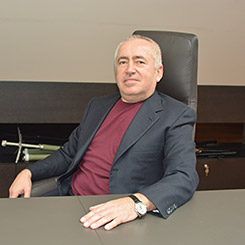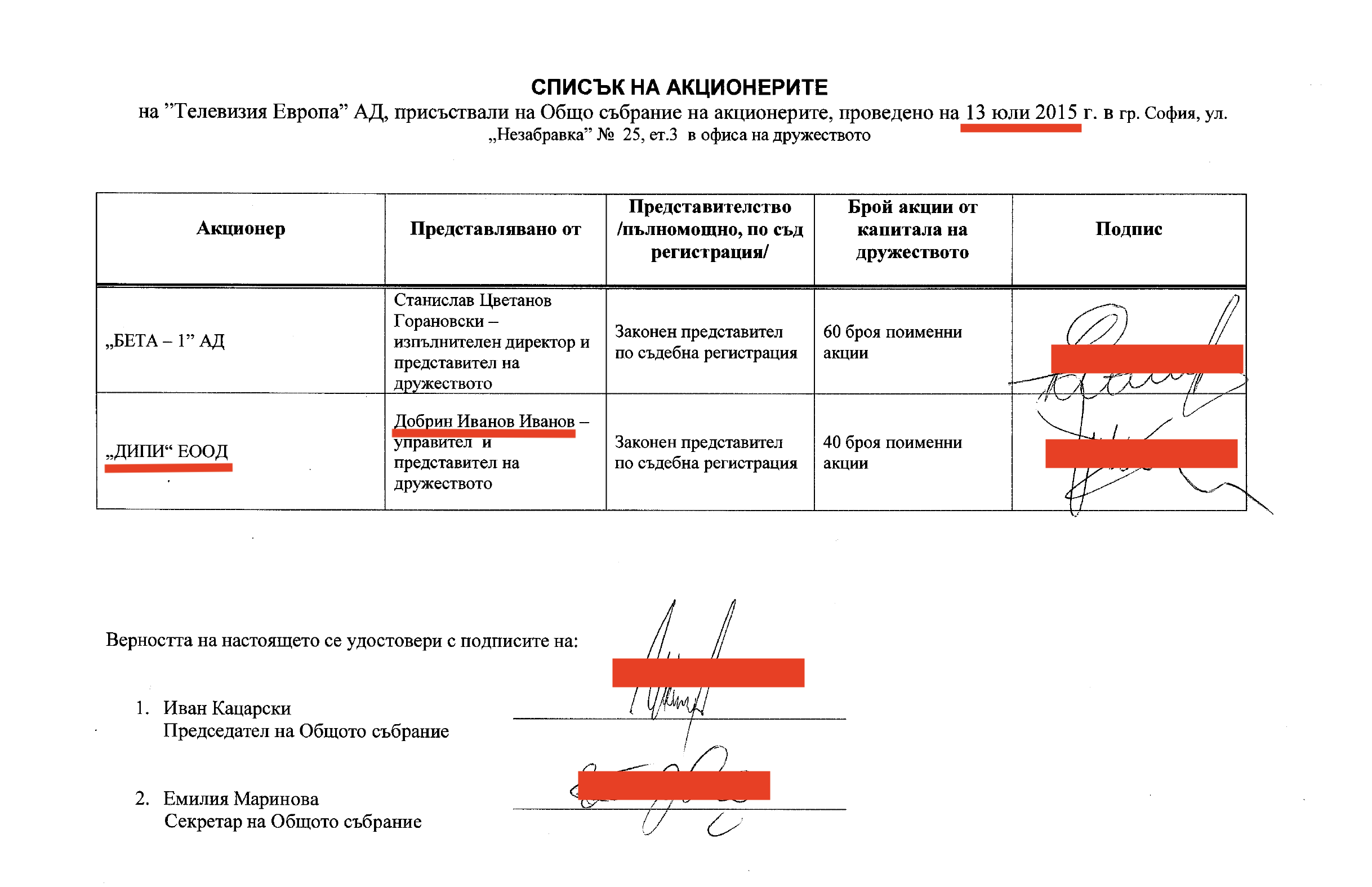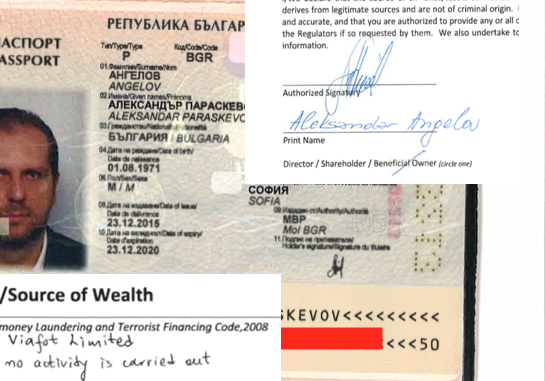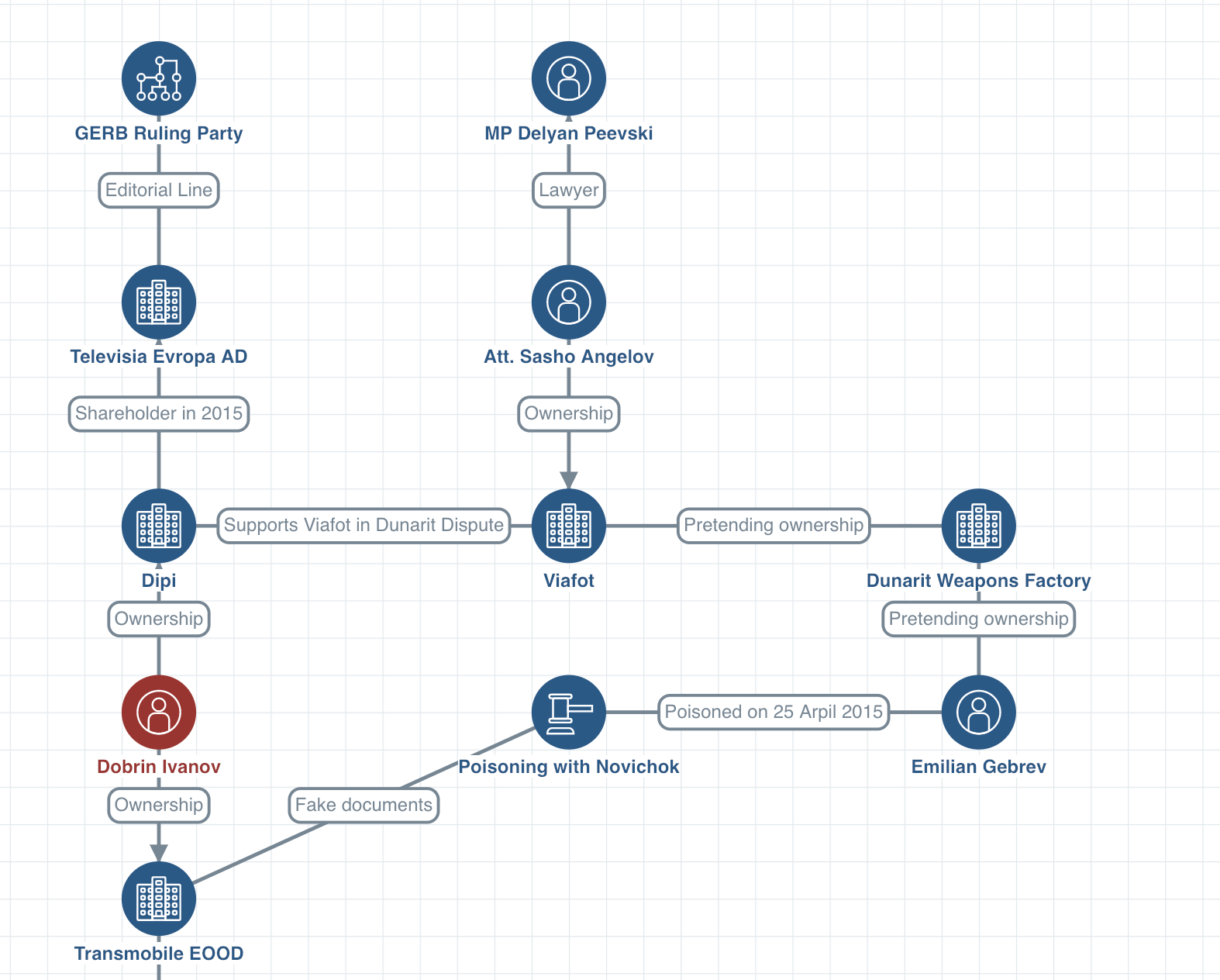A company of arms trader Dobrin Ivanov received large sums from an offshore company linked to the money laundering scheme uncovered by Moscow lawyer Sergei Magnitsky, the FinCEN Files and an investigation by the Italian Prosecutor’s Office into the Volonte case reveal. Ivanov serves the interests of controversial Bulgarian lawmaker and media mogul Delyan Peevski and is the owner of Bulgarian cable TV “TV Europe”, often referred to as the mouthpiece of the ruling party Citizens for European Development of Bulgarian (GERB).
Three transfers for a total of EUR 1,096,921 were received in the account of arms trading company Transmobil in Bulgarian private lender Investbank between January and July 2015. They came from the account of the company Solidstar Worldwide in Danske Bank in Estonia.
Solidstar is mentioned in the “Azerbaijani Laundromat” investigation and was detected by FinCEN for sending money from Bulgaria to a company under investigation in the Magnitsky case.
Two events took place at the time the money was flowing to Transmobil in Bulgaria. The owner of Transmobil acquired shares in TV Europe and arms dealer Emiliyan Gebrev was poisoned with a Novichok-type substance. The investigative website Bellingcat revealed that the attack on Gebrev was the work of GRU agents and linked Transmobil to the international “Skripal” scandal.
The data on the transfers of Solidstar Worldwide to Transmobil emerged from the investigation by the Italian authorities against politician Luca Volonte in connection with the “Azerbaijani Laundromat”. The Italian newspaper L’Espresso shared them with the International Consortium of Investigative Journalists (ICIJ). The records document activities of the Estonian branch of Danske Bank. Bivol worked on examining them with partners from the Danish Broadcasting Corporation.
At the time when it received the transfers, Transmobil was owned by businessman Dobrin Ivanov and Plamen Simeonov, former Director of Bulgarian gun and ammunition manufacturing company Dunarit. Currently, Dobrin Ivanov is the sole owner of Transmobil and owns TV Europe through another company associated with Delyan Peevski.
Solidstar is also of particular interest to US financial intelligence. This is revealed in FinCEN documents, which Bivol is examining together with partners from the International Consortium of Investigative Journalists (ICIJ).
Solidstar Worldwide ended in the FinCEN files due to suspicious US dollar transfers. The company incorporated in the British Virgin Islands has been spotted transferring money from Danske Bank and Bulgaria’s Investbank to companies involved in the Magnitsky case and in large-scale money laundering schemes.
Russian lawyer Sergei Magnitsky was the first to uncover a scheme to steal money from the Russian treasury and launder it through offshore companies. He was arrested in 2008 and died after eleven months in police custody without a trial and adequate medical treatment. The scandal sparked an investigation in the United States and sanctions against Russian businessmen and officials. A law against corruption and money laundering, known as the Magnitsky Act, was passed by the US Congress and signed by President Barack Obama in December 2012.
So far, however, only a small fraction of Russia’s missing millions have been found, as they have been syphoned through a complex network of offshore shell companies. The unraveling of the network continues to this day through a series of investigations known as the “Azerbaijani Laundromat”, the “Troika Laundromat” and the criminal prosecutions in Europe following these revelations. The transactions described in FinCEN’s secret reports are now added to this database.
Bivol is the Bulgarian partner of the ICIJ, which organized a team of more than 400 journalists from 110 news organizations in 88 countries to examine more than 2,100 documents from the US Department of Treasury’s Financial Crimes Enforcement Network, FinCEN. The reports spanning the 2011-2017 period first leaked to BuzzFeed News which shared them with the ICIJ. ICIJ launched the publications known as the FinCen Files on September 20, 2020, in 108 media outlets around the world. They reveal shocking evidence of how global banks facilitate cash flows in the service of oligarchs, drug traffickers and terrorists.
In the course of this journalistic investigation, Bivol obtained and analyzed more than 14,000 documents, including data from the Volonte investigation in Italy. The interception of data from various sources complements the picture of suspicious transactions and in this case connects them with the highest echelons of power in Bulgaria.
Owner of mouthpiece TV, proxy of Peevski
In 2015, Dobrin Ivanov became the co-owner of TV Europe through his company DP Investment. TV Europe is known in Bulgaria for frequently broadcasting propaganda in support of the ruling GERB party. Two years later, Ivanov bought all shares and is now the sole owner the “party” television. Before that, the television was owned by GERB MEP Emil Stoyanov, brother of former Bulgarian President Petar Stoyanov.
The public face of TV Europe is Georgi Harizanov. Harizanov is Executive Director and Board Member of TV Europe. He was appointed to the Board of the State-owned Irrigation Systems in the first term of GERB’s cabinet and subsequently removed after the scandalous reports that he was investigated for particularly large scale theft and had been convicted for racketeering in the past. Now, in addition to being a TV boss, Harizanov also masquerades as a political scientist, regularly pushing the government’s talking points.
Ivanov’s appearance in the capital of TV Europe through DP coincides with the money transfers from Solidstar Worldwide to Transmobil.
According to an investigation by Bulgarian weekly Capital, the same company, DP, coordinates with the offshore company Viafot raider attacks to take over the ownership of arms factory Dunarit from Emiliyan Gebrev. It is an intermediary in a chain of loan transfers through which a Dunarit receivable of nearly BGN 47 million passed to Viafot. A subsidiary of DP received as “reward” from the trustees of the collapsed Corporate Commercial Bank (CCB) non-performing loans and real estate collateral, which can easily become profitable. After DP Investment became the owner of the most attractive assets of the failed bank, it passed into the hands of Irida Ltd., registered in the Ajman Free Zone in the United Arab Emirates (UAE).
As a Bivol investigation based on the “Panama Papers” showed, Delyan Peevski’s lawyer, Sasho Angelov is the owner of Viafot. Angelov is the son of Paraskev Paraskevov, an ex-high-ranking officer of the State Security (the Communist regime’s secret services – “Darzhavna Sigurnost” or DS, also known as the “Bulgarian KGB”).
According to media reports from that time, Paraskevov had been close to the SIC group, an alleged powerful organized crime group in the 1990s. Dobrin Ivanov also has business connections with emblematic figures from the former crime group. He is a partner with prominent SIC protagonist Slavyan Teofilov in companies that became infamous for large-scale construction on Irakli, a pristine Bulgarian beach. Current Bulgarian Prime Minister Boyko Borisov was allegedly also associated with this group in the past.
Bivol made several unsuccessful attempts to reach Transmobile. Our team sent questions to the company’s e-mail and repeatedly called the phone number listed for contact on the website transmobile.eu but all calls were picked by an answering machine. We left a message with our contacts but no response was received until the editorial closure of this article.
“Bulgarian accomplice” of GRU poisoners?
Transmobil attracted the attention of the international investigative site Bellingcat, which uncovered Emiliyan Gebrev’s Russian poisoners. According to Bellingcat, the attack against Gebrev with a Novichok-type substance was preceded by a forged note of Bulgaria’s Ministry of Foreign Affairs to the Azerbaijani Embassy for the supply by plane of weapons purchased by the Pentagon for the moderate rebels in Syria. The note initially included the name of Gebrev’s arms manufacturing company Emco but it had been subsequently replaced with the names of two other companies, Transmobil and Alguns, as they had been the real exporters.
The date of the diplomatic note coincides with the time of the first attack on Gebrev, Bellingcat said. Bellingcat did not provide documentary confirmation of the forgery, details of what it had been exactly and did not indicate the source of the information, but the note KO 194-45-1/ April 30, 2015 is found in a leaked database from the Azerbaijani Embassy in Sofia published by anonymous hackers.
Pointing to this connection, Emko asked the Bulgarian Prosecutor’s Office in early 2020 to investigate a possible “Bulgarian accomplice” in Gebrev’s poisoning.
“It is important to clarify the forgery contained in official correspondence by the Ministry of Foreign Affairs of Bulgaria, part of which is diplomatic note KO 194-45-1/April 30, 2015 and other documents coinciding with the dates surrounding the crime,” Emco wrote in a statement after the Prosecutor’s Office accused three unnamed Russians of trying to kill Gebrev in 2015.
After the poisoning of the Russian opposition leader Alexei Navalny, Emiliyan Gebrev resumed his call to find the Bulgarian accomplices of the attack against him in an open letter sent in September to Prime Minister Boyko Borisov, Prosecutor General Ivan Geshev, President Rumen Radev and EU and NATO ambassadors.
The date of the forged diplomatic note and the two attempts to poison Gebrev on April 28, 2015, and at the end of May 2015 coincide in time with transfers from Solidstar Worldwide to Transmobil as they were made between January and July 2015. Wires are detected on the following dates:
January 8, 2015 – EUR 278,921, Ref 1501085104068866
March 10, 2015 – EUR 714,000, Ref 1503105101094508
July 9, 2015 – EUR 104,000, Ref 1507095105983343
All transfers are marked as “commission agreement from 25.08.12, partial payment for AZ/STI-017”.
These data from the Estonian investigation into Danske Bank are not exhaustive and it cannot be claimed that this is the entire amount received by Transmobil, nor that the money was wired only during this period and only from this account.
But the very fact that a company received money from an offshore linked to the laundering of money from the Russian treasury at the exact same time when Transmobil was involved in suspicious manipulation of official documents to falsely implicate Gebrev in certain arms deliveries deserves special attention by investigators.
We recall that Alguns, which is a partner of Transmobil in the Azerbaijani arms deal, was also exposed in the FinCEN files as the beneficiary of a USD 30 million transfer to its account at the Bulgarian Development Bank from a company with a shady reputation.
Alguns is linked to Bulgarian organized crime. BuzzFeed’s investigations revealed that Alexander Dimitrov, the owner of Alguns, has a connection to Boyan “The Baron” Petrakiev, a major Bulgarian organized crime figure. Petrakiev told Buzzfeed in an interview in Sofia that he had introduced Dimitrov to “powerful people” and that it was his connections that helped Dimitrov become a successful arms trader.
Solidstar Worldwide’s banking activity has been reported as suspicious to US financial intelligence by the correspondent bank, Bank of New York Mellon (BNYM), after it has detected transfers totaling USD 100,000 from Investbank Bulgaria to Castelfront LLP, a company under investigation in the Magnitsky case.
Castlefront is one of the important shell companies identified in the Magnitsky investigation in the United States.
New York federal prosecutors brought in 2013 a civil forfeiture case against Prevezon Holdings, a company owned by Russian businessman Denis Katsyv, the son of a former Russian government minister. The case is known as the United States of America v. Prevezon Holdings. Prevezon counterattacked with a lawsuit against the US government.
Castlefront LLP is described in the filing as a shell company used for transfers from Russia.
“An elaborate fraud against the Russian Treasury resulted in the payment of approximately 5.4 billion rubles to three companies that had been fraudulently misappropriated from the Hermitage Fund, a foreign investment fund,” the US Department of Justice’s filing reads.
“After the 5.4 billion rubles were paid, a network of shell companies inside and outside Russia laundered these proceeds. Certain of these transfers passed through the United States, either on their way to defendant Prevezon Holdings, or on their way to two other shell companies, Castlefront and Megacom Transit. Four transfers totaling approximately $2.75 million were routed into and out of the United States in this way. These constituted international transportation of stolen property in violation of 18 U.S.C. § 2314.
The further laundering engaged in by Megacom and Castlefront, in sending the funds through another company to Prevezon, and by Prevezon, in investing the funds first in Europe and then into New York real estate, constituted money laundering,” further said the US government in its filing.
The Prevezon case and the US government allegations have been extensively covered in the media since 2015. The case ended in 2017 with a settlement with US prosecutors, according to which Prevezon had to pay USD 6 million dollars to the United States.

Shell companies linked to the Magnitsky case and the Azerbaijdjani laundromat banking through Bulgarian Investbank
It turns out that Castlefront has continued to operate undisturbed through its accounts in Europe despite its infamous reputation.
The company has maintained an account in a Czech bank owned by multibillionaire and richest man in the Czech Republic Petr Kellner, Bivol’s partners from the Czech investigative portal Investigaze revealed. Kellner has had serious business interests in Bulgaria in recent years as the owner of Telenor Bulgaria, the largest mobile network and the third-largest fixed telecommunications company in Bulgaria, and a bidder to buy the largest private television bTV.
The FinCEN files reveal that Castefront received on April 28, 2017, a wire in the amount of USD 100,000 from a Solidstar Worldwide account in the Bulgarian Investbank, owned by Petya Slavova. The transaction was reported in a suspicious activity report (SAR) by the correspondent bank BNYM.

SAR report showing Solidstar Worldwide banking through Investbank with Castlefront. Source: FinCen Files
Upon learning that the offshore company Solidstar Worldwide had a bank account in Investbank, Bivol sent questions to the bank, asking how much money had passed through this account and whether the transactions had been reported to the Bulgarian financial intelligence.
The bank replied that “the said company is currently not a client of Investbank and has no accounts in the bank.”
The official statement sent by Investbank shows that it does not see anything wrong with the wire from Solidstar to Castlefront:
“Other bodies and institutions are authorized to investigate possible crimes and prove them, while banks are mandated to inform these bodies in cases where they have reasonable doubts about the unproven origin of the funds in the money transfers made by the clients. In case of a delay in the execution/non-execution of a money transfer whose accompanying documentation is completely in order, there is a very high risk for the banks due to the fact that the client has the right and can file a lawsuit under the Payment Services and Payment Accounts Act.”
Investbank also insists that it “applies strictly the Anti-Money Laundering Measures Act and the regulations for the implementation of this Act to all its clients”.
Investbank did not answer Bivol’s repeated questions to clarify when was the Solidstar account opened, who was declared as beneficiary, how much money went through it and when exactly was it closed. We also did not receive an answer to our questions about Transmobil’s accounts and the wires to them by the Estonian accounts of Solidstar Worldwide.
Investbank only sent a reply saying that the requested information “includes facts and circumstances constituting bank secrecy within the meaning of Art. 62, para. 2 of the Credit Institutions Act, which can be disclosed only upon fulfillment of the specific requirements of the law. At the same time, we are not allowed to provide names and other personal data of beneficial owners/persons authorized to dispose of the bank’s customers’ accounts to third parties without their explicit and specific consent in accordance with the requirements of Regulation 679/2016 on the protection of individuals in connection with the processing of personal data and the free movement of such data.”
This is not the first case when Investbank has been involved in suspicious transactions. More than USD 158 million are currently frozen there in accounts suspected to hold dirty petrodollars of Venezuelan dictator Nicolas Maduro. Bivol also revealed earlier that Investbank processes offshore accounts of companies associated with Israeli national Gal Barak, accused of large-scale financial fraud, who was extradited from Bulgaria and is now on trial in Austria.
Investbank is also mentioned in a diplomatic cable by former US Ambassador to Bulgaria John Beyrle on the “bad apples” in the Bulgarian banking system involved in money laundering.
“Azerbaijani Laundromat” and “Troika Laundromat”
Solidstar and Castlefront are also involved in another money laundering case that began in Italy after the scandalous revelations from the “Azerbaijani Laundromat“, an extensive journalistic investigation by the Organized Crime and Corruption Reporting Project (OCCRP). Bivol was a partner in this investigation. Its revelations are now confirmed by the FinCEN Files.
The “Azerbaijani Laundromat” revealed that billions had moved through the Estonian branch of Danske Bank through shell companies. The money was used by Azerbaijan’s ruling elite as “a secret slush fund to pay off European politicians, buy luxury goods, launder money, and otherwise benefit themselves”.
For example, Solidstar received money from Jetfield Networks Limited, detected by the “Azerbaijani Laundromat” investigation for transfers to Italian politician Luca Volonte, the same FinCEN report, which examines Solidstar transfers from Investbank to Castelfront, reveals. Both companies are investigated in Italy as part of the probe into Volonte’s activities. Jetfield is considered the third biggest contributor to the “Azerbaijani Laundromat” for having laundered EUR 2.9 billion for the regime in Baku.
The FinCEN Files show that BNYM has identified footballer Javid Huseynov as the owner of Solidstar and Jetfield. He is most likely just a straw person, as the companies opened accounts in the Moscow bank International Financial Club OJSC in August 2015. This happened two weeks after Huseynov was arrested in connection with the death of a journalist.

BNMY identified the UBO of Solidstar – the football player Javid Hyuseinov, obviously a straw man Source: FinCen Files
A Bulgarian also stood out among the beneficiaries of wires from the “Azerbaijani Laundromat”. This is Kalin Mitrev, a Bulgarian representative to the European Bank for Reconstruction and Development (EBRD), and husband of Bulgarian politician and former Director-General of UNESCO, Irina Bokova.
From 2012 to 2014, Mitrev received several transfers totaling EUR 345,000 from Metastar Invest LLP, Polux Management LP and Hilux Services LP. These three companies, together with Jetfield, are at the heart of the “Azerbaijani Laundromat” scheme.
Mitrev said the money was for consulting services on land reclamation projects in Azerbaijan. The Bulgarian Prosecutor’s Office launched an investigation, which concluded that everything was legal.
The companies that made transfers to Mitrev are also listed in Italy’s Volonte case.
Bivol and its ICIJ partners reviewed the case documents provided by L’Espresso. They show that bank transfers from Solidstar Worldwide in Estonia to Transmobil in Bulgaria have also attracted the attention of the anti-money laundering department of Danske Bank.
Some of the offshore companies detected in the “Azerbaijani Laundromat” also appear in the “Troika Laundromat” investigation, which revealed how more than USD 200 billion was syphoned from Russia through the Estonian branch of Danske Bank.
Castefront, the company investigated in the Magnitsky case, is also among them. It has allegedly moved nearly USD 400 million through its accounts. The same documents show that USD 23 million moved through Solidstar Worldwide’s accounts.
But the FinCEN Files also make it clear that focusing on the accounts of the companies in the Estonian branch of Danske Bank would not be enough to reveal the full picture and scale of these laundromats and of the Magnitsky case.
Just a handful of documents with fragmentary data show that Castelfront banks in the Czech Republic and Solidstar Worldwide banks in Bulgaria. At the same time, commissions of suspicious origin are flowing to an arms trading company linked to Bulgaria’s ruling party, Bulgarian oligarch Peevski and the huge Novichok poisoning scandal.
Assembling the puzzle requires lifting bank secrecy and aggressive actions by investigators in other European countries.
However, the forecast for the success of such an investigation in Bulgaria is pessimistic due to the involvement of people with strong government ties and figures from the shadowy backstage rule.
***
If you find this article useful, support our work with a small donation.
Pay a Bivol Tax!
We will highly appreciate if you decide to support us with monthly donations keeping the option Monthly
The form is not published.
IBAN: BG27 ESPY 4004 0065 0626 02
BIC: ESPYBGS1
Титуляр/Account Holder: Bivol EOOD
При проблеми пишете на support [at] bivol [dot] bg












You must be logged in to post a comment.